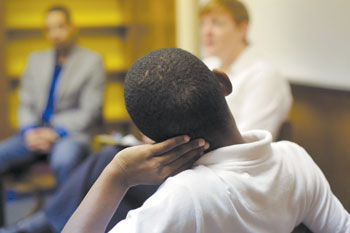 Cumberland County Schools are charting a course to reduce out-of-school student suspensions. The school system and the Cumberland County Chapter of the NAACP recently held a forum to review strategies and develop new approaches to embrace restorative justice practices and reduce suspensions. Restorative justice is an approach in which the response to an incident is a meeting between the victim and the offender, the goal being to share their experience of what happened and create a consensus for what the offender can do to repair the harm from the offense.
Cumberland County Schools are charting a course to reduce out-of-school student suspensions. The school system and the Cumberland County Chapter of the NAACP recently held a forum to review strategies and develop new approaches to embrace restorative justice practices and reduce suspensions. Restorative justice is an approach in which the response to an incident is a meeting between the victim and the offender, the goal being to share their experience of what happened and create a consensus for what the offender can do to repair the harm from the offense.
Dozens of community stakeholders met at the Cliffdale Regional Branch Library for a School Discipline Forum, according to a news release provided by Cumberland County Schools. The forum, entitled Alternatives to Suspensions: Rethinking School Discipline, provided information on the effects of suspensions, aims to stop the school-to-prison pipeline and how the community can work together to improve academic and life outcomes for students.
Up & Coming Weekly asked CCS to elaborate on student racial inequities. Associate Superintendent Lindsay Whitley said the most up-to-date information that has been certified and can be released is from the 2017-2018 school year: “Out-of-school suspensions by ethnicity,” involved 6,526 African-American pupils compared to 1,175 whites. Lindsay said 45.09% of the student body was African-American. He did not respond to an inquiry as to what the administration attributed the imbalance, saying that “there are many factors that may contribute to suspension rates in CCS.”
Peggy Nicholson of the Youth Justice Project and the Southern Coalition for Social Justice acknowledged the work is being done to reduce suspensions and racial inequities, while noting that there is still more work to be done. She provided two major strategies to help CCS move forward — increasing institutional equity while decreasing suspensions and court referrals.
School Superintendent Dr. Marvin Connelly, Jr. shared a variety of strategies that school officials currently use to reduce suspensions, including conferences with students and parents, restorative justice practices and positive behavioral interventions. “A suspension is not discipline — it is the consequence of an action,” said Connelly.
The National Center for Education Statistics disagrees saying “suspensions and expulsions are disciplinary actions taken by a school or district in response to a student’s behavior.”
Connelly added that “when students are not in school, they cannot learn. We’re committed to reviewing policies and procedures through an equity lens, with the goal of reducing the number of out-of-school suspensions and expanding alternatives to suspensions.”
The NCES notes that grade retention, suspension and expulsion are all associated with negative outcomes, such as an increased risk of dropping out of school. Retention, however, can be related to both disciplinary and academic issues; a student might be retained because of behavioral issues or because the student is not academically ready to progress to the next grade level.
“The forum was a call to action to create better outcomes for our youth,” said Emily Chapman Grimes, education committee chair for the NAACP. “We’ve talked about racial disparities in school suspensions for far too long. It’s time to do something. School leadership, community members, the NAACP and its coalition partners are ready to collaborate to create better outcomes for the youth in Cumberland County.”
Dozens of community stakeholders met at the Cliffdale Regional Branch Library for a School Discipline Forum, according to a news release provided by Cumberland County Schools.